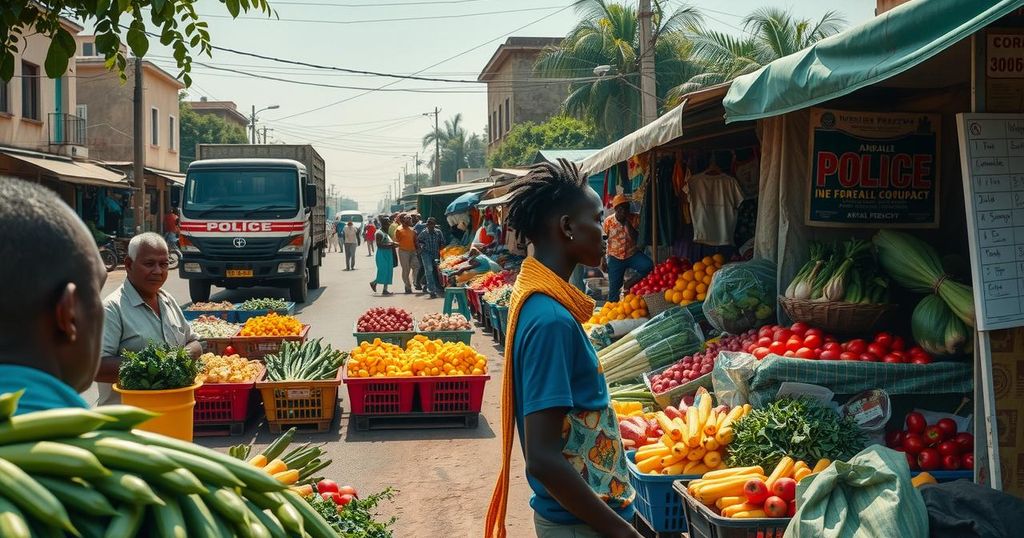Zimbabwe Police Crack Down on Informal Vendors Amid Economic Crisis
Recent crackdowns by Harare municipal police on informal vendors have raised critical questions regarding economic efficiency and support for the 80% of Zimbabweans who rely on this sector. With costs of policing far outstripping city revenues, community leaders argue for better resource allocation to support rather than stifle these vital contributors to the economy.
The informal vendor scene in Harare is chaotic. Municipal police—both in uniforms and plainclothes—often sneak through the bustling streets, unleashing panic on unsuspecting sellers. Vendors scramble for their goods as police seize items, loading them into trucks. Saul Nhema, who recently began selling vegetables after losing his construction job, noted, “They have no mercy at all. Once they take your stock, you’ll never get it back.”
This crackdown on vendors has become a trend for the Harare City Council. They’ve engaged in repeated raids, destroying goods and maintaining a strong police presence. Although the government argues these operations are necessary to uphold city regulations and public health, the persistent targeting of informal vendors raises eyebrows. Critics, including various local residents, question the rationale when basic services like clean water are often lacking.
For example, in 2024, the revenue for the council was merely US$3 million, while the police operations to control vendors cost over US$24 million—a staggering eight times the council’s income. Fast forward to 2025, the council set up a dedicated police unit to intensify its campaign against these vendors, resulting in costs that could reach 12 times its projected annual income, which is expected to drop to US$2 million.
This financial strain is mostly shouldered by the central government. Informal vendors like Zvikomborero Guvheya and Nhema contribute significantly to Zimbabwe’s economy, yet they find themselves frequently under siege from local authorities. Reuben Akili, who directs the Combined Harare Residents Association, points out that funds dedicated to enforcement could be better utilized, for instance, rehabilitating public markets.
He argues, “If we examine the funds allocated for enforcement covering salaries, fuel, and operational costs, those resources could have been redirected toward rehabilitating markets or public restrooms in the city.” Informal vendors make up over 80% of the population in Zimbabwe, contributing nearly 72% to its GDP. And as many stores continue to shut their doors due to the ongoing currency crisis, the role of street vendors is becoming increasingly vital.
Even amidst their importance, vendors encounter numerous challenges, operating in unregulated and unfriendly environments. Often, they are removed under the guise of maintaining urban order and are labeled as threats to formal businesses. Akili noted that the special police unit raises concerns, asserting that providing vendors with infrastructure would be a more sensible approach.
While there are designated spaces for vendors within the business district, many choose to avoid these due to high rental costs and a lack of customer traffic. Securing a formal business license costs between US$400 and US$800 annually, a daunting figure for many in an economy that has struggled for years. Samuel Wadzai, executive director of the Vendors Initiative for Social and Economic Transformation, believes there needs to be some compromise in addressing these matters without jeopardizing the livelihoods of those relying on informal work.
“Raids haven’t been effective, not even when a former minister of local government requested deployment of the army to push out vendors,” Wadzai reflects. He further questions the effectiveness of these methods: “Did that result in any significant change in terms of the challenges that we are seeing? I think it’s a big no.”
Often, to evade being raided, vendors are forced to pay bribes. Jesman Guvheya, a vendor and single mother of five, revealed that police sometimes extract US$1 daily from each vendor, and multiple police groups can lead to total fees reaching $4 a day to avoid harassment. Unfortunately, even this bribe system does not guarantee uninterrupted business, as the police could still seize goods.
Jesman stated, “Sometimes we are left with little stock that we will have secured elsewhere,” indicating the precarious nature of their operations. While she managed to avoid arrest during one encounter, her son, also working as a vendor, was not so lucky. He was caught by the city’s police, leading her to pay a bribe just to secure his release from custody.
To summarize, the ongoing raids on informal vendors in Harare have sparked significant concerns, primarily centered on their economic and social implications. With the city council’s increasing financial burden resulting from these operations, critics argue that resources should instead support the sector that is crucial to many Zimbabweans. As the informal sector grows, finding a balance between regulation and support appears essential for both vendors and the overall economic climate.
Original Source: www.thezimbabwean.co




Post Comment